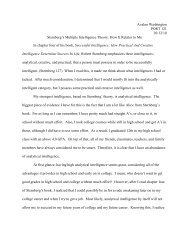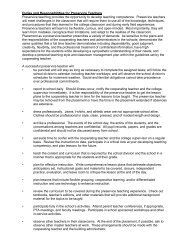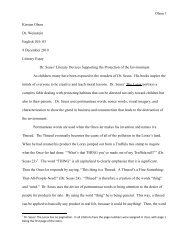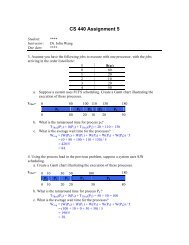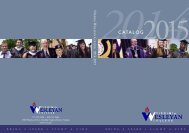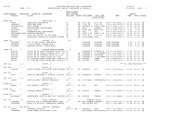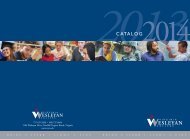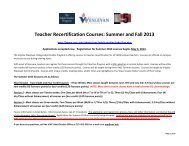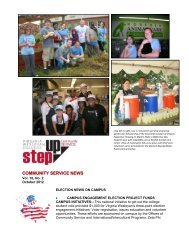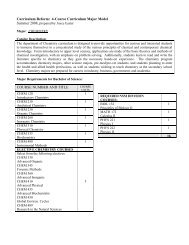2008-2009 Catalog - Virginia Wesleyan College
2008-2009 Catalog - Virginia Wesleyan College
2008-2009 Catalog - Virginia Wesleyan College
- No tags were found...
You also want an ePaper? Increase the reach of your titles
YUMPU automatically turns print PDFs into web optimized ePapers that Google loves.
PSYCHOLOGY151A variety of viewpoints on how an individual might attainoptimal psychological well-being are discussed. No prerequisites,but intended primarily for freshmen andsophomores; upperclassmen by consent only. Offered eachspring.277 Learning Theory (3) (E)The highly influential and controversial perspectiveknown as behaviorism is explored, first by helping studentsunderstand the logical basis for its characteristic insistencethat only objectively measurable behavior can be subject togenuinely scientific investigation, and then by demonstratinghow its principles have guided much ofpsychology’s inquiry about the form of learning known asconditioning. Applications in the areas of therapy, selfmanagement,and behavior modification in organizationsare described. Also considered are the ethical issues thathave been raised concerning the use of this approach. Noprerequisites, but intended primarily for freshmen andsophomores; upperclassmen by consent only. Offered fall ofeven-numbered years.280 The Descriptive Methods ofPsychological Science (4)(E)Focuses on the theory and practice of interviewing,direct observation, and the collection of unobtrusivemeasures within the context of special topics (e.g., positivepsychology). Orientation to these special topics is followedby a discussion of the descriptive methods listed above, arelevant field experience, opportunities to learn how toorganize, analyze, and draw conclusions from data collectedduring these experiences, in-class critiques of each experience,and the creation of summative reflective memos. Weconclude with an evaluation of our efforts and an explicitcomparison of qualitative and quantitative approaches toasking and answering research questions. Prerequisites: atleast sophomore status, PSY 201, or consent. Offered eachspring.300 Teaching Assistants’ Program (1, 2, or 3)On the basis of superior performance in psychologycourses and evidence of an ability to communicate well,students may be invited to participate in this program. EachTeaching Assistant (TA) will be assigned duties that supportthe instructional objectives of the psychology faculty andthat provide occasions for learning more about psychologyand for developing better interpersonal skills. A studentaccepted into the program may enroll for one, two, or threesemester hours depending on the nature and extent of theresponsibilities that are assigned. A student may enroll forPSY 300 more than once, but may apply no more than atotal of three semester hours earned in this manner towardsatisfaction of the requirements for a major in psychology.Pass/fail grading. Offered when circumstances permit.303 Resident Community Leadership (1)Resident Assistants (RAs) develop their skills as peercounselors and group leaders. RAs will share theirexperiences through group discussions and structuredprocesses. Enrollment limited to current ResidentAssistants. Pass/fail grading. Offered each semester.310 Quantitative Analysis of Research Data (3)Emphasizes the data analysis side of psychologicalresearch, stressing understanding of the fit of analysistechniques with data collection methods and researchdesign. Selection of the appropriate statistic, computation,and interpretation of results is stressed for the morecommon parametric and some nonparametric statistics.The use of multivariate statistics and their interpretationwhen they are encountered in the research literature isbriefly introduced although multivariate computation isnot addressed. Prerequisites: junior/senior status, MATH106 and declared major in psychology or consent. Offeredeach fall.320 Designing & EvaluatingResearch in Psychology (3)(E) WBy the end of the term, each student proposes anexperiment that reflects by its design a properunderstanding of the scientific method as an approach forstudying psychological phenomena. In order to develop therequisite skills for this effort, class presentations willconcentrate on such matters as using the professionalliterature, the logic of experimentally based inquiry,selection of appropriate data-gathering strategies, and theethical responsibilities of those who perform psychologicalresearch. Prerequisites: junior/senior status and at least 9semester hours in psychology including PSY 310 orconsent. Offered each spring.322 Organizational Psychology (3)Focuses on the interaction of individuals andorganizations with an emphasis on the world of work.Strategies for improving organizational effectiveness areexplored in terms of such factors as work design,institutional and individual development, motivationalsystems, social dynamics, and leadership patterns.Prerequisites: junior/senior status, and any 200-levelpsychology course. Offered spring of odd-numbered years.324 Group Dynamics (3)By participating as a member of a small group, eachstudent gains firsthand knowledge of the factors that needto be monitored and controlled in order for such a workunit to respond productively to the obligations placed uponit. Classroom presentations prepared by the groups aimtoward raising each individual’s consciousness about variousissues related to collective functioning (e.g., leadershipstyles, goal-setting techniques, decision-making strategies,maintenance of group cohesion, and providing for effectivecommunication). Prerequisites: junior/senior status, any200-level course in psychology, or EDUC 225 and consent.Offered each fall.



